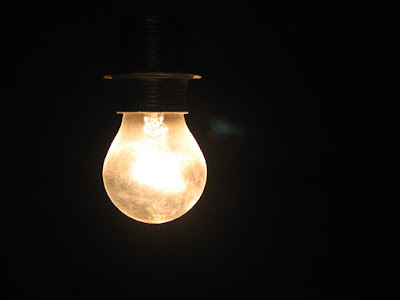The Worst Religion
G. K. Chesterton in Orthodoxy describes what he thinks to be
the worst form of religion, what he calls the "worship of the god
within":
"Of all conceivable forms of enlightenment the worst is
what these people call the inner light. Of all horrible religions the most
horrible is the worship of the god within...That Jones shall worship the god
within him turns out that Jones shall worship Jones. Let Jones worship the sun
or moon, anything rather than the Inner Light; let Jones worship cats or
crocodiles, if he can find any in his street, but not the god within.
Christianity came into the world firstly in order to assert with violence that
a man had not only to look inwards, but to look outwards, to behold with
astonishment and enthusiasm a divine company and a divine captain. The only fun
of being a Christian was that a man was not left alone with the Inner Light,
but definitely recognized an outer light, fair as the sun, clear as the moon,
terrible as an army with banners" (Chesterton, 1063)
 In stark contrast to the modern philosophy of which I have
spoken of time and time again that supposes man to be good, that supposes man
ought to follow his heart and every passing inclination; Chesterton says that
the only correct posture is one that looks outward. As opposed to finding
delight and liberation in "who we are", Christianity asserts that we
are thoroughly depraved beings whose hearts are deceitful above all things
(Jeremiah 17:9). Our righteousness is the equivalence of filthy rags (Isaiah
64:6); and though we may scour the world for a truly good person there is in
fact no one who does good (Romans 3:12). The Biblical indictment against man is
as extreme as it is unpopular: We are sin-tainted, evil beings.
In stark contrast to the modern philosophy of which I have
spoken of time and time again that supposes man to be good, that supposes man
ought to follow his heart and every passing inclination; Chesterton says that
the only correct posture is one that looks outward. As opposed to finding
delight and liberation in "who we are", Christianity asserts that we
are thoroughly depraved beings whose hearts are deceitful above all things
(Jeremiah 17:9). Our righteousness is the equivalence of filthy rags (Isaiah
64:6); and though we may scour the world for a truly good person there is in
fact no one who does good (Romans 3:12). The Biblical indictment against man is
as extreme as it is unpopular: We are sin-tainted, evil beings.
It only figures then that the worst religion is when man,
instead of subjecting himself to God in humility and obedience as he was
created to do, looks within to that polluted inner light. When instead of
serving the one who is outside himself, he turns inward and serves the god
within. Is this not what the forward thinking builders of the tower of Babel
proclaimed as they built their structure to the heavens: "Let us make a
name for ourselves!" (Genesis 11:4) Is this not the lie that Eve believed
when she took of the fruit and ate: "You shall be like God, knowing good
and evil." (Genesis 3:5) Is this not the degraded charge against the
people of Israel: "They did what was right in their own eyes." (Judges
21:25)
St. Augustine says the following when examining the sin of
our first parents:
"What is the origin of our evil will but pride? For
'pride is the beginning of sin.' And what is pride but the undue exaltation?
And this is undue exaltation, when the soul abandons Him to whom it ought to
cleave as its end, and becomes a kind of end to itself. This happens when it
becomes its own satisfaction. And it does so when it falls away from that
unchangeable good which ought to satisfy it more than itself." (St.
Augustine, 10861)
He continues on: "By craving to be more, man becomes
less; and by aspiring to be self-sufficing, he fell away from Him who truly
suffices him." (10890)
Pride is the root of all sin, and such revolt against our
created order will not go unpunished. Scripture reminds us that he who exalts
himself will be humbled. Therefore, as Christians we have to reject with fury
the age old religion in modern clothes that rejects heaven's design in self
worship. We have to be skeptical of things we feel a natural bent towards, and
mindful of what that "Outer Light" desires and requires.
May we follow in the words of Christ: daily denying ourselves,
living wholly subject to Him.
***
Chesterton, G. K. Orthodoxy. 2012. Kindle Edition.
St. Augustine. City of God. Skyros Publishing. 2015. Kindle
Edition.



Comments
Post a Comment